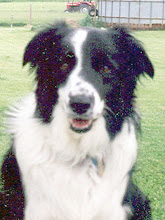Monday, April 13, 2020
Celebrating too Early?
I was patting myself on the back for a successful lambing season: 34 lambs in 16 days, a nearly 200 percent lambing rate, two gentle assists, no dead lambs and only one undersized lamb who is determined to catch up.
Then, as I was moving the ewes and lambs to pasture, I saw it: a ewe with a bald patch on her side.
My flock are mostly Katahdins with a touch of Dorper. Unlike wool sheep, these hair sheep shed their winter coats in the spring and reveal a short, summer coat. But this ewe wasn't revealing a short coat. She had a bald spot.
I had 3 choices:
I could ignore it and hope it magically went away.
I could take a photo and post it to sheep groups on the internet and receive lots of advice on medications and treatments that may or may not work.
I could isolate the ewe and her twin lambs and call my vet.
When you own sheep, you do most of the vet work yourself. A vet call for a ewe is usually about half the price of the ewe. However, if you're worried about a flock issue--and visions of bald sheep were running through my head--then a vet call is worth it.
I called my vet. While his expertise is horses, he grew up with sheep and is familiar with most diseases, parasites, and other problems that affect sheep.
He ruled out mites and lice and other parasites. She was a big, healthy ewe who wasn't scratching, depressed or worried one bit about going bald. Hormones? This was her first pregnancy. Bedding? He wasn't sure. But he was almost definite it wasn't a flock problem. So, we dosed her with ivermectin and vitamins.
To be on the safe side, he recommended isolating her and her ewes from the flock for several weeks. And, unlike humans in this age of Covid-19, she doesn't have to wear a mask.
Update on 4/16/2020: After posting this, three yearling ewes also showed signs of hair loss. So, I contacted Brady Campbell who leads the sheep team at Ohio State University. I provided him with my vet's report, my hay analysis and a detailed description and history.
He reported that hair and wool loss in ewes post parturition isn't uncommon due the huge nutritional stresses on the ewe. While I was supplementing the ewes with corn due to the bad hay year, their diets were a little light in protein. So, I'm adding protein to their diets until the pastures come on in the next few weeks.
And, on another note, a huge shout out to state extension services. They've always been a great resource for sheep, farming, gardening, etc.
Subscribe to:
Post Comments (Atom)














No comments:
Post a Comment